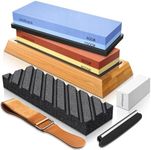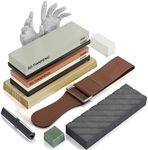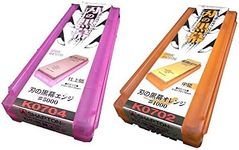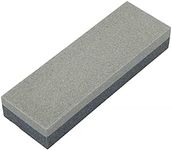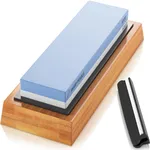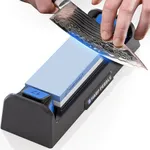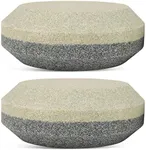Buying Guide for the Best whetstones
Choosing the right whetstone is essential for maintaining the sharpness and longevity of your knives and other cutting tools. A good whetstone can make the sharpening process more efficient and effective, ensuring that your blades remain in top condition. When selecting a whetstone, it's important to consider several key specifications to find the best fit for your needs. Understanding these specifications will help you make an informed decision and achieve the best results from your sharpening efforts.Grit SizeGrit size refers to the coarseness or fineness of the whetstone's surface, which determines how much material it removes from the blade. Grit sizes are typically categorized into coarse (200-600 grit), medium (800-2000 grit), and fine (3000-8000 grit). Coarse grit stones are used for repairing damaged edges or reshaping blades, medium grit stones are ideal for general sharpening, and fine grit stones are used for polishing and refining the edge. To choose the right grit size, consider the condition of your knives and the level of sharpness you desire. If you need to repair or reshape a blade, start with a coarse grit. For regular maintenance, a medium grit is usually sufficient. For achieving a razor-sharp edge, finish with a fine grit stone.
MaterialWhetstones can be made from various materials, including natural stones, synthetic stones, and diamond stones. Natural stones, such as those from Japan, are known for their high quality and ability to produce a fine edge, but they can be more expensive and require more maintenance. Synthetic stones are more affordable and come in a wide range of grit sizes, making them versatile and easy to use. Diamond stones are extremely durable and can sharpen very hard steels quickly, but they can be more abrasive and may wear down blades faster. To choose the right material, consider the type of knives you have and how often you plan to sharpen them. If you have high-quality knives and want the best possible edge, a natural stone may be worth the investment. For general use and ease of maintenance, synthetic stones are a great choice. If you need to sharpen very hard or damaged blades, a diamond stone may be the best option.
SizeThe size of the whetstone affects how easy it is to use and how well it can accommodate different blade sizes. Whetstones come in various lengths, widths, and thicknesses. Larger stones provide a more stable surface and can handle larger knives more effectively, while smaller stones are more portable and easier to store. To choose the right size, consider the types of knives you will be sharpening and the space you have available for storage. If you primarily sharpen large kitchen knives, a larger stone will provide better control and efficiency. For smaller knives or if you need a portable option, a smaller stone may be more convenient.
BaseSome whetstones come with a base or stand, which can provide stability and make the sharpening process easier and safer. Bases can be made from various materials, such as rubber, wood, or plastic, and may include features like non-slip surfaces or adjustable angles. To choose the right base, consider how much stability you need and the surface you will be using the whetstone on. If you want a more secure and comfortable sharpening experience, look for a whetstone with a sturdy, non-slip base. If you prefer to use the stone on different surfaces or angles, an adjustable base may be beneficial.
Water vs. OilWhetstones can be used with either water or oil as a lubricant to reduce friction and prevent metal particles from clogging the stone. Water stones are more common and easier to clean, as they only require soaking in water before use. Oil stones, on the other hand, require oil as a lubricant and can provide a smoother sharpening experience but may be messier and harder to clean. To choose between water and oil stones, consider your preference for maintenance and ease of use. If you want a more straightforward and less messy option, a water stone is likely the best choice. If you prefer a smoother sharpening experience and don't mind the extra maintenance, an oil stone may be suitable.
